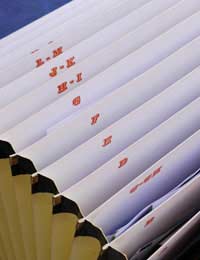Ensuring Your Inheritance Paperwork is in Order

Many of us don’t like to make any plans that involve thinking about our own passing, or the passing of loved one’s. Whilst this is understandable it is also the case that our passing remains a certainty and that that final passing will necessitate those we leave behind playing a part in resolving our financial affairs.
As well as settling debts and retrieving money owed, the person that you designate as the Executor of you Will will need to value your entire Estate (meaning all property and all assets) and will then need to report that value to the correct authorities (for further information see related articles) in order to ensure that the right amount of Inheritance Tax is paid on the property. They will also need to ensure that all property and money is recovered so that it may be properly divided amongst those named in the Will – that is supposing that they find a Will; if they do not then standard legal provisions will be made for the distribution of the Estate, which in some cases may seem entirely inappropriate (if, for example, the deceased would have had no intention or wish to leave the money to a certain wayward child, who in the eyes of the law may be entitles to money, if not otherwise stipulated in the Will).
A Place For Everything
In light of the above it makes sense to keep all paper work relating to finances (such as bank statements, bills, etc.) in one place in your home. In fact, if one wants to take things really seriously the Will itself should really be kept hidden and under lock and key to ensure that it has not been tampered with or modified by unauthorised persons with. You may then wish to keep it separately from your paperwork but leave instructions with one person as to where the Will is kept.Precisely how far you go in taking measures to ensure the security of your financial paperwork and your Will is up to you, but do ensure that things are kept neatly, in a way that makes them unidentifiable, and in a place where they will be found at least by the executor. A cluttered array of your papers may make sense to you, but not to a grieving sand pressured relative/
If you want to make things really easy for people then also leave contacts of your G.P. and the phone contacts of all of your banks, your pension plan company and any companies you may have life insurance with. Also eave details of any tenants, letting agencies or landlords you may deal with. Be sure to leave them a relevant up to date number if possible for everyone they made need to contact.
Of course, you may not want to spend days of your life preparing the ground for when you do pass away. However, there is nothing being suggested (perhaps with the exception of making and securely storing a Will) which will not be beneficial in your day to day affairs – having paperwork in order saves time and hassle on an almost daily basis, and in many cases helps one to better manage their finances in general.
If you are in any further doubt as to the benefit of keeping things in order do think about how much time you spend (and have spent) trying to make the lives of those you care about more comfortable during your lifetime. You surely want to make things easier in the difficult few days and months when you are no longer around too: a little bit of time now will make all the difference in the future.
Do remember that these days much valuable information may be accessed on the Internet and not via paperwork. In this case leave merely your bank details to your Executor upon your passing, who can then contact your bank for further information. Do not share Internet passwords with anyone.
If in any doubt as to how to make a will, contact a will writing service, solicitor or the Citizens Advice Bureau.


Re: Will Inheritance Affect My Council Tenancy?
Im facing similar situation. Inheritence only enough to buy foreign property, agricultural holding, or derelict…
Re: Inheriting Property
Am I allow to get housing benefit on my mums property till its sold?even though I will eventually be entitled to 25%of the sale
Re: Inheriting Property
Am I allow to get housing benefit on my mums property till its sold?even though I will eventually be entitled to 25%of the sae
Re: Will Inheritance Affect My Council Tenancy?
I am living in temporary council accommodation and due to illness am receiving PIP plus Universal Credit. I am…
Re: Will Inheritance Affect My Council Tenancy?
I’m a council tenant my died and left a flat over 55 to live in that buliding to me how’s do I go ambition…
Re: Will Inheritance Affect My Council Tenancy?
I doubt this will be answered as I can’t see any answers to anyone else’s comments but here goes My mum wants…
Re: Will Inheritance Affect My Council Tenancy?
I have inherited property from my mother in law, as we live in council property could we rent the inherited…
Re: Will Inheritance Affect My Council Tenancy?
Assured social housing tenant (SH), lone parent recently deceased leaving an estate including a 3 bedroom…
Re: Will Inheritance Affect My Council Tenancy?
My disabled son lives in a council flat and receives benefits, including PIP. How could I arrange for him to…
Re: Will Inheritance Affect My Council Tenancy?
me and my brother are set to inherit 2 propertys but we have council flats. will we loose our rights to council…